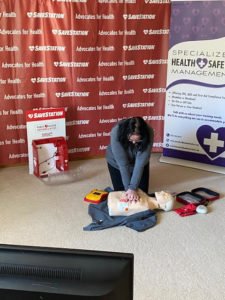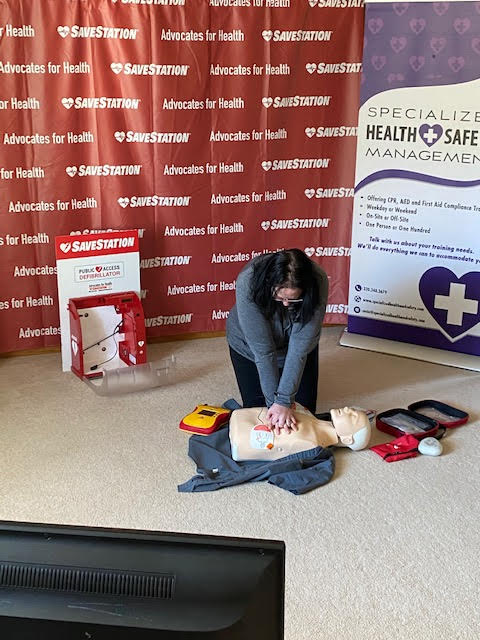by Dennis Dalman
news@thenewsleaders.com
The so-called new normal involves students being taught via interactive Internet classes, adults doing their work long distance via computers and cardiopulmonary resuscitation trainers teaching families via Zoom.
And all because of a vicious virus that has infected at least a million Americans and killed more than 55,000. In Minnesota, the Covid-19 virus caused the deaths of more than 300 people at last count.
People continue to find ingenious ways of coping, of making do and of living by that adage, “Where there’s a will there’s a way.”
That is the attitude of Rich Feneis, a Sartell resident and founder of Advocates for Health, a nonprofit organization that distributes automated external defibrillators, AED SaveStations, throughout Central Minnesota. A vital component of those stations is an awareness-raising campaign that includes CPR training, which is often crucial for cardiac-arrest victims until the AED devices can shock the heart back to life.
Two of the CPR trainers are Suzie Wistrom and Brianna Inkster, who own and operate the Specialized Health and Safety Co. in St. Cloud.
After a successful trial program, the training sessions are going well, thanks to the Zoom interactive computer application. Here’s how it works. Families sign up for the program, and each family is given a CPR dummy to use for training purposes. Each dummy is carefully swabbed with a disinfectant solution before it is delivered to a family’s house. Then time segments are scheduled, and Inkster and/or Wistrom teach the technique via Zoom. Entire families, including younger children, can learn CPR and how to use the automated external defibrillators. The dummy emits audible clicks when the CPR chest compressions are done properly.
So far, families have signed up in St. Joseph and Cold Spring, and soon the training will be extended to families in Sartell, Richmond and Waite Park. All of those cities have multiple AED SaveStations, thanks to so many involved, such as Feneis, St. Joseph’s Joel Vogel, the CentraCare Foundation, trainers, volunteers and fundraisers.
About 350,000 Americans die every year because of cardiac arrest.
“As I get older and I see friends and family pass away,” Feneis said, “the one thing I want to do is give people the chance to grow old with their spouses, watch their kids and grandkids develop into fine human beings and feel how great life is. I can’t think of a better way to do that than by spreading the word about how AEDs save lives. They can turn a survival rate of 8 percent into a (cardiac arrest) survival rate of 75 percent or more.”
The one thing Feneis hears most often when the subject of AEDs comes up is this fear expressed by people: “I could never use that machine on anybody. I’d be afraid that I’d kill the person.”
Feneis is quick to put that fear to rest.
“You can’t kill anybody with an AED,” he tells them. “It’s not possible.”
What’s more, each AED has precise voice prompts that tell the user exactly, step by step, how to do the easy procedure.
Feneis, his organization and many others have worked hard to expand the number of SaveStations throughout Central Minnesota and beyond. There have been meetings with state legislators and even with the Minnesota State High School League to teach CPR to students as part of the required curriculum for grades seven through 12.
The Covid-19 virus put a stop to a lot of things, Feneis noted, but he and others are finding creative, ingenious ways to keep life moving forward.
“Other businesses like restaurants are adjusting their business model to this new normal,” he said. “And we too are adjusting our business model, using media like Zoom, to educate people and potentially to save more lives.”
Any families interested in participating in the CPR remote-teaching program should contact Feneis at 320-260-4040.

Suzie Wistrom does chest compressions on a “dummy” as part of a training session viewed by families via Zoom. Note the TV in foreground.




